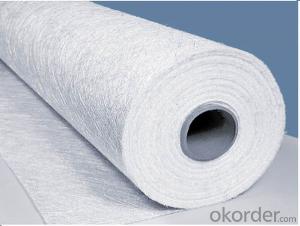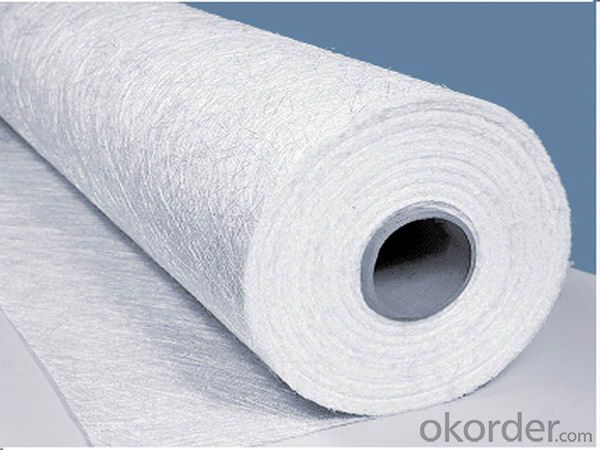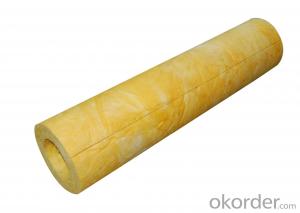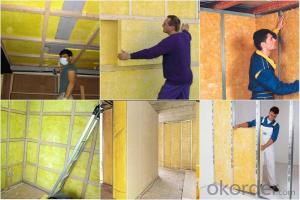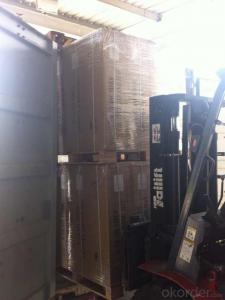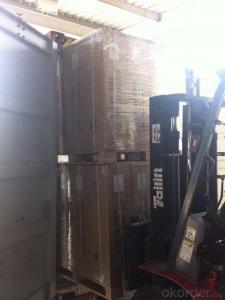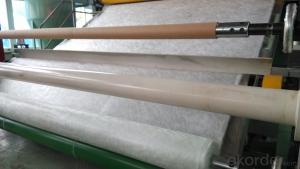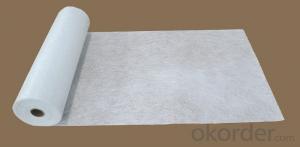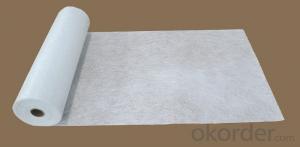Fiberglass Mat Tissue E-Glass Fiber Chopped Strand Mat Emulsion Bonded
- Loading Port:
- Shanghai
- Payment Terms:
- TT or LC
- Min Order Qty:
- 20000 kg
- Supply Capability:
- 200000 kg/month
OKorder Service Pledge
OKorder Financial Service
You Might Also Like
1.Brief Introduction
E-Glass Emulsion Chopped Strand Mat is made of randomly distributed chopped strands held tighter by a emulsion binder. It is compatible with UP, VE, EP resins.
It is compatible with UP, VE, EP, PF resins.
Additional demands on wet-out and decomposition time may be available upon request.
It is designed for use in hand lay-up, filament winding, compression molding and continuous laminating processes. Its end-use applications include boats, bath equipment, automotive parts, chemical corrosion resistant pipes, tanks, cooling towers and building components
2.Product Features
Fast breakdown in styrene
High tensile strength, allowing for use in hand lay-up process to produce large-area parts
Good wet-through and fast wet-out in resins, rapid air lease
Superior acid corrosion resistance
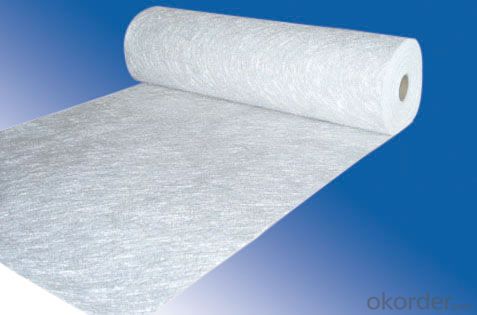
3. Product Specifications
Fiber type: E-glass
Unit weigth:100g/m2 150g/m2 200g/m2 220g/m2
Binding type: Powder or Emulsion;
Roll width: 50mm-3300mm
Roll weight:30kg/roll
4.FAQ
Packaging:
Each Chopped Strand Mat is wound onto a paper tube which has an inside diameter of 76mm and the mat roll has a diameter of 275mm. The mat roll is wrapped up with plastic film,and then packed in a cardboard box or wrapped up with kraft paper. The rolls can be vertically or horizontally placed. For transportation, the rolls can be loaded into a container directly or on pallets.
Storage:
Unless otherwise specified, Chopped Strand Mat should be stored in a dry, cool and rain-proof area. It is recommended that the room temperature and humidity should be always maintained at 15℃~35℃ and 35%~65% respectively.
- Q: How is fiberglass mat tissue used in the production of pipes and tanks?
- Due to its unique properties, fiberglass mat tissue is widely used in the manufacturing of pipes and tanks. This material is ideal for reinforcement and insulation purposes. By combining fine glass fibers with a binder, a thin, flexible, and porous material is created. In the production of pipes, fiberglass mat tissue serves as a reinforcement layer. It enhances the structural integrity and strength of the pipe. Typically, it is placed between multiple layers of resin, such as polyester or epoxy, during the manufacturing process. This reinforcement provides added strength and rigidity to the pipe, making it more resistant to external pressures, impact, and corrosion. Furthermore, fiberglass mat tissue improves the insulation properties of pipes. Its porous nature allows it to trap air within its structure, creating a layer of thermal insulation. This insulation helps maintain the temperature of the fluid or gas within the pipe. As a result, it reduces heat loss and energy consumption. Similarly, in the production of tanks, fiberglass mat tissue plays a crucial role in reinforcing and insulating the tank structure. It is used as a layer between the tank walls and the resin matrix, providing reinforcement and reducing the risk of structural failure. The tissue also acts as a thermal insulator, helping to maintain the desired temperature inside the tank. Overall, fiberglass mat tissue is an essential component in the manufacturing of pipes and tanks. Its reinforcement properties enhance structural integrity, while its insulation properties improve energy efficiency and temperature control. This makes fiberglass mat tissue a versatile and reliable material for various industries, including oil and gas, chemical processing, water treatment, and many others.
- Q: How does the fiber distribution of fiberglass mat tissue affect its strength?
- The fiber distribution of fiberglass mat tissue has a significant impact on its strength. The strength of fiberglass mat tissue is primarily derived from the fibers embedded within the material. These fibers provide reinforcement and help to distribute stress and load evenly across the surface. The distribution of fibers in fiberglass mat tissue refers to how the fibers are arranged and oriented within the material. If the fibers are evenly distributed, with a uniform arrangement and orientation, the strength of the fiberglass mat tissue will be enhanced. This uniform distribution allows for efficient load transfer from one fiber to another, leading to improved overall strength. On the other hand, if the fiber distribution is uneven or random, with fibers clumped together or oriented in different directions, the strength of the fiberglass mat tissue will be compromised. Uneven distribution can result in stress concentrations at certain areas, leading to weak points and potential failure under load. Furthermore, the fiber length and density also play a role in determining the strength of fiberglass mat tissue. Longer fibers provide greater reinforcement and improve the overall tensile strength of the material. Additionally, a higher fiber density, meaning more fibers per unit area, increases the strength and overall performance of the fiberglass mat tissue. In summary, the fiber distribution of fiberglass mat tissue directly affects its strength. A uniform and evenly distributed arrangement of fibers enhances the material's strength by facilitating efficient load transfer, while an uneven or random distribution compromises its strength by creating stress concentrations and weak points. Additionally, the fiber length and density also contribute to the overall strength of the fiberglass mat tissue.
- Q: What is the typical thickness range of fiberglass mat tissue?
- The specific application and manufacturer can cause the typical thickness range of fiberglass mat tissue to vary. Typically, fiberglass mat tissue can be found in thicknesses ranging from 0.2 mm to 0.5 mm. This range provides flexibility in choosing the suitable thickness according to the desired strength, durability, and specific requirements of the intended use. It is important to mention that slight variations in thickness may occur due to manufacturing processes and individual product specifications.
- Q: Can fiberglass mat tissue be used for making insulation blankets?
- Yes, fiberglass mat tissue can be used for making insulation blankets.
- Q: What is fiberglass mat tissue?
- Fiberglass mat tissue is a non-woven material made from fine glass fibers that are randomly laid and bonded together. It serves as a reinforcement material in various applications, providing strength, durability, and improved mechanical properties to the final product.
- Q: Can fiberglass mat tissue be used for repairing fiberglass boats?
- Yes, fiberglass mat tissue can be used for repairing fiberglass boats. It is commonly used in boat repairs to reinforce weak or damaged areas and provide strength and durability to the repaired sections.
- Q: Is fiberglass mat tissue compatible with different adhesives?
- Yes, fiberglass mat tissue is compatible with different adhesives. Fiberglass mat tissue is a versatile material that can be used in various applications such as construction, automotive, and aerospace industries. It is commonly used as a reinforcement material in composites, where it is combined with resin and adhesive to create strong and durable structures. The compatibility of fiberglass mat tissue with different adhesives depends on several factors such as the type of adhesive, the specific application, and the desired performance requirements. Fiberglass mat tissue can be compatible with a wide range of adhesives including epoxy, polyester, vinyl ester, and polyurethane adhesives. It is important to consider the specific properties and characteristics of the adhesive and the fiberglass mat tissue when selecting the adhesive for a particular application. Factors such as curing time, viscosity, bond strength, and chemical resistance should be taken into account to ensure optimal adhesion and performance. In some cases, surface treatment or priming may be necessary to enhance the compatibility between the fiberglass mat tissue and the adhesive. This can involve applying a primer or using a specific surface treatment method to promote adhesion and ensure a strong bond between the two materials. Overall, fiberglass mat tissue is compatible with different adhesives, but it is crucial to consider the specific requirements of the application and select the appropriate adhesive and surface treatment method to achieve the desired results.
- Q: How does fiberglass mat tissue perform in terms of moisture vapor resistance?
- Fiberglass mat tissue performs well in terms of moisture vapor resistance. It is highly resistant to moisture vapor, preventing its penetration and protecting the underlying materials. The tightly woven fibers of the tissue create a barrier that limits the transfer of moisture, making it an effective choice for applications where moisture control is crucial.
- Q: What are the different grades of fiberglass mat tissue available?
- In the market, you can find various grades of fiberglass mat tissue. These grades differ in terms of their weight, thickness, and strength. The most popular grades include lightweight, medium-weight, and heavyweight fiberglass mat tissue. When it comes to lightweight fiberglass mat tissue, it is generally thinner and lighter compared to other grades. It is commonly used in situations where flexibility and easy handling are important. This grade is suitable for projects like laminating lightweight structures, making molds, and doing repairs. If you're looking for a versatile option that offers a balance between strength and flexibility, medium-weight fiberglass mat tissue is the way to go. It is widely used in boat building, automotive repairs, and general fiberglass reinforcement. This grade provides sufficient strength while still being manageable to work with. On the other hand, if you need superior strength and durability, heavyweight fiberglass mat tissue is the grade for you. It is the thickest and heaviest grade available in the market. This grade is perfect for applications that require high structural integrity, such as construction, aerospace, and marine industries. Apart from these standard grades, there may be variations and special grades available depending on the manufacturer and the specific requirements of your project. It is crucial to consult with a supplier or manufacturer to determine the most suitable grade of fiberglass mat tissue for your particular application.
- Q: Can fiberglass mat tissue be used for making insulation panels?
- Yes, fiberglass mat tissue can be used for making insulation panels. It is a commonly used material due to its excellent thermal insulation properties and its ability to resist heat and cold. Additionally, fiberglass mat tissue is lightweight, durable, and can be easily molded into various shapes and sizes, making it suitable for insulation panel production.
Send your message to us
Fiberglass Mat Tissue E-Glass Fiber Chopped Strand Mat Emulsion Bonded
- Loading Port:
- Shanghai
- Payment Terms:
- TT or LC
- Min Order Qty:
- 20000 kg
- Supply Capability:
- 200000 kg/month
OKorder Service Pledge
OKorder Financial Service
Similar products
Hot products
Hot Searches
Related keywords
